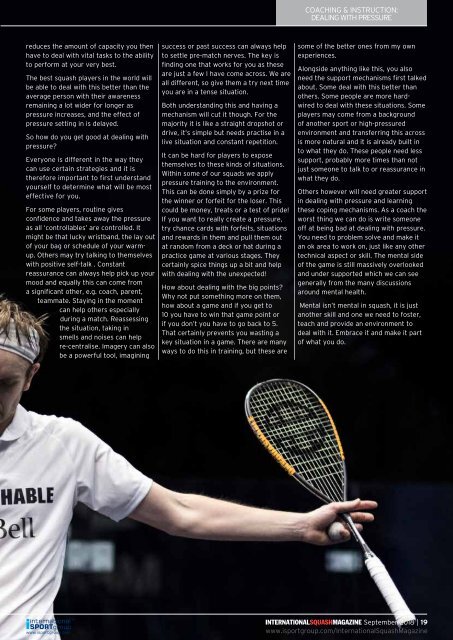ISSUE03-2018InternationalSquashMagazine
Create successful ePaper yourself
Turn your PDF publications into a flip-book with our unique Google optimized e-Paper software.
COACHING & INSTRUCTION:<br />
DEALING WITH PRESSURE<br />
reduces the amount of capacity you then<br />
have to deal with vital tasks to the ability<br />
to perform at your very best.<br />
The best squash players in the world will<br />
be able to deal with this better than the<br />
average person with their awareness<br />
remaining a lot wider for longer as<br />
pressure increases, and the effect of<br />
pressure setting in is delayed.<br />
So how do you get good at dealing with<br />
pressure?<br />
Everyone is different in the way they<br />
can use certain strategies and it is<br />
therefore important to first understand<br />
yourself to determine what will be most<br />
effective for you.<br />
For some players, routine gives<br />
confidence and takes away the pressure<br />
as all ‘controllables’ are controlled. It<br />
might be that lucky wristband, the lay out<br />
of your bag or schedule of your warmup.<br />
Others may try talking to themselves<br />
with positive self-talk . Constant<br />
reassurance can always help pick up your<br />
mood and equally this can come from<br />
a significant other, e.g. coach, parent,<br />
teammate. Staying in the moment<br />
can help others especially<br />
during a match. Reassessing<br />
the situation, taking in<br />
smells and noises can help<br />
re-centralise. Imagery can also<br />
be a powerful tool, imagining<br />
success or past success can always help<br />
to settle pre-match nerves. The key is<br />
finding one that works for you as these<br />
are just a few I have come across. We are<br />
all different, so give them a try next time<br />
you are in a tense situation.<br />
Both understanding this and having a<br />
mechanism will cut it though. For the<br />
majority it is like a straight dropshot or<br />
drive, it’s simple but needs practise in a<br />
live situation and constant repetition.<br />
It can be hard for players to expose<br />
themselves to these kinds of situations.<br />
Within some of our squads we apply<br />
pressure training to the environment.<br />
This can be done simply by a prize for<br />
the winner or forfeit for the loser. This<br />
could be money, treats or a test of pride!<br />
If you want to really create a pressure,<br />
try chance cards with forfeits, situations<br />
and rewards in them and pull them out<br />
at random from a deck or hat during a<br />
practice game at various stages. They<br />
certainly spice things up a bit and help<br />
with dealing with the unexpected!<br />
How about dealing with the big points?<br />
Why not put something more on them,<br />
how about a game and if you get to<br />
10 you have to win that game point or<br />
if you don’t you have to go back to 5.<br />
That certainly prevents you wasting a<br />
key situation in a game. There are many<br />
ways to do this in training, but these are<br />
some of the better ones from my own<br />
experiences.<br />
Alongside anything like this, you also<br />
need the support mechanisms first talked<br />
about. Some deal with this better than<br />
others. Some people are more hardwired<br />
to deal with these situations. Some<br />
players may come from a background<br />
of another sport or high-pressured<br />
environment and transferring this across<br />
is more natural and it is already built in<br />
to what they do. These people need less<br />
support, probably more times than not<br />
just someone to talk to or reassurance in<br />
what they do.<br />
Others however will need greater support<br />
in dealing with pressure and learning<br />
these coping mechanisms. As a coach the<br />
worst thing we can do is write someone<br />
off at being bad at dealing with pressure.<br />
You need to problem solve and make it<br />
an ok area to work on, just like any other<br />
technical aspect or skill. The mental side<br />
of the game is still massively overlooked<br />
and under supported which we can see<br />
generally from the many discussions<br />
around mental health.<br />
Mental isn’t mental in squash, it is just<br />
another skill and one we need to foster,<br />
teach and provide an environment to<br />
deal with it. Embrace it and make it part<br />
of what you do.<br />
INTERNATIONALSQUASHMAGAZINE September 2018 | 19<br />
www.isportgroup.com/InternationalSquashMagazine
















